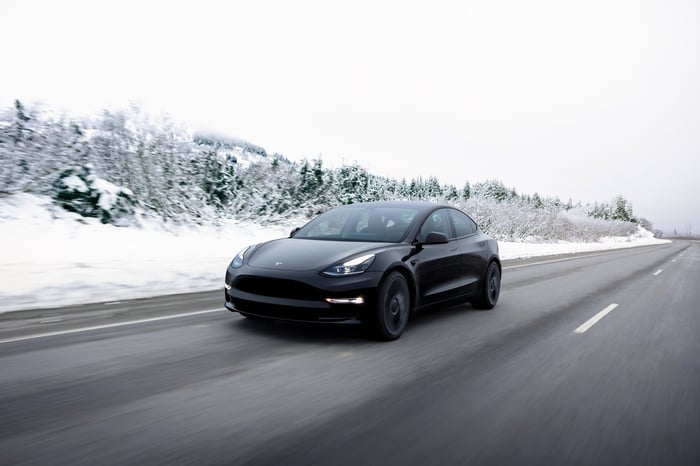A lot can happen over the course of a century. The companies that drove the U.S. economy forward 100 years ago look nothing like the companies creating the most value today:
|
Year |
Milestone |
|---|---|
|
1901 |
United States Steel became the first company in the entire world to amass a $1 billion valuation. |
|
1955 |
Car manufacturer General Motors became the world's first $10 billion company. |
|
1995 |
Industrial conglomerate General Electric beat every other company to a $100 billion valuation. |
|
2018 |
On the back of the iPhone wave, Apple became the world's first $1 trillion company. |
The technology sector reigns supreme these days, with Microsoft, Amazon, and Google parent Alphabet all joining Apple in the $1 trillion club since 2018 (Apple went on to hit valuations of $2 trillion in 2020 and $3 trillion in 2022).
Another company is knocking on the $1 trillion door
Tesla (TSLA 1.15%) is the global leader in electric vehicle (EV) sales, and it was a member of the $1 trillion club for a short time in 2021 before the sell-off in the technology sector dragged its valuation down by more than half (at the low point).
The company is worth $783 billion now, which means its stock only needs to rise 28% to cross the $1 trillion threshold again -- and electric vehicle sales won't be its only path to getting there.
Plus, last year, Tesla executed a 3-for-1 stock split that increased its share count threefold and reduced its stock price by two-thirds. As a result, investors can buy one whole share for $249 today, whereas prior to the split, they would have forked out $747. It didn't change the underlying value of the company one bit, but it does make Tesla stock more accessible to investors of all experience levels.
With that in mind, here's why investors small and large should consider riding Tesla stock back into the market's most exclusive club.

Image source: Tesla.
Tesla is gearing up for the self-driving revolution
Tesla estimates it will produce 1.8 million electric vehicles in 2023, but global adoption of EVs continues to grow rapidly thanks to government incentives and environmentally conscious consumers. As a result, CEO Elon Musk believes Tesla will grow that figure more than tenfold by 2030, producing 20 million vehicles per year from as many as 12 Gigafactories.
While that would be a significant value-add for investors, Tesla's cars might soon be a platform for a far more lucrative software product that empowers them with fully autonomous self-driving capabilities. The company already has an estimated 2.7 million vehicles on the road testing the latest beta version, and those customer cars have completed 150 million autonomous miles driven to date. Musk thinks a wider public release could come as soon as this year.
Not only will Tesla earn revenue from selling the software to customers, but it also plans to build an autonomous ride-hailing network where it will earn a share of revenue from participating vehicles. Musk says the average passenger car is heavily underutilized because it spends just 12 hours on the road per week, but if it had self-driving software installed, it could spend its downtime earning money by shuttling passengers around as a robotaxi. That revenue would be split 50/50 or even 70/30 between the owner of the vehicle and Tesla.
In an interview with CNBC's David Faber, Musk said this could transform Tesla's economics by increasing the gross profit margin from producing each vehicle from 25% to 70% in the long term.
But that's not all. Musk recently expressed his willingness to license the full self-driving software to other car brands that aren't developing their own. It could open the door to another multibillion-dollar revenue opportunity.
Tesla could be worth far more than $1 trillion
Tesla stock isn't exactly cheap right now, especially because the company has been cutting the price of its vehicles, which will impact its earnings power going forward. Based on its $3.85 in trailing-12-month earnings per share, Tesla trades at a price-to-earnings (P/E) ratio of 63 right now. That's more than double the ratio of the average big tech company, represented by the Nasdaq-100 index, which trades at a P/E of just 30.
But according to Ark Investment Management, which is run by noted tech investor Cathie Wood, Tesla stock could be on the way to $2,000 a share by 2027. That represents a 718% gain from where it trades today, and it would place the company at a whopping $6.1 trillion valuation.
Ark believes Tesla will generate a shade over $1 trillion in revenue by then, with the robotaxi segment accounting for 44% (or $449 billion). Based on the firm's modeling of the autonomous ride-hailing industry, which suggests there will be $4 trillion in revenue up for grabs by 2027, Tesla would only have a modest 11% market share.
Assuming Ark's estimates prove correct, there might even be upside to Tesla's valuation. But one thing is for sure: A 28% stock price gain from here will place the company alongside Apple, Microsoft, Amazon, and Alphabet in the $1 trillion club, and that appears to be a foregone conclusion.





